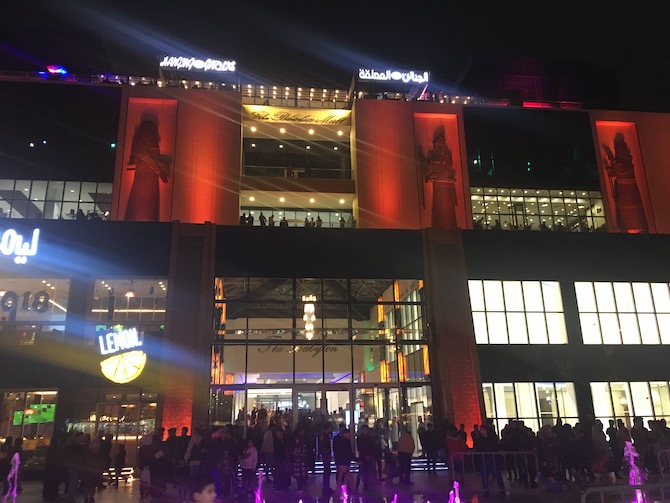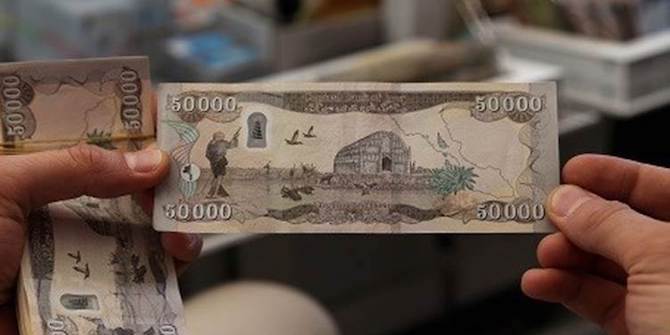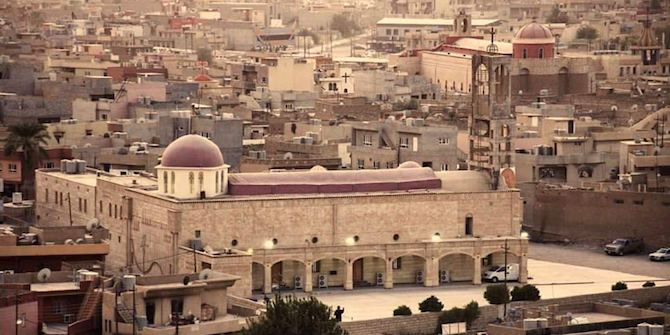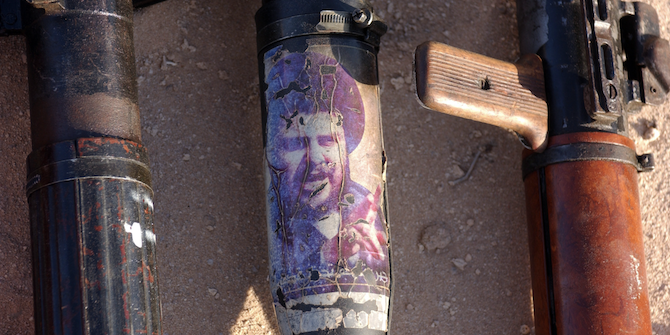by Omar Sirri

I could barely hear Abu Abdallah over the generator outside. As I got up to shut the door to the caravan that he called his office, he deadpanned: ‘hadha al-sowt yuwannis, lazem t’awid alay’ (This sound brings joy, you should get used to it). Mocking the country’s infamous electricity services, Abu Abdallah, a representative on a neighbourhood council in Mansour district in western Baghdad, was also making fun of himself and his workplace conditions. The caravan was cramped but cold. The air conditioning was blasting, a chilly respite from the June heat for which we were all grateful. Abu Abdallah’s colleague was sitting at the other desk hurrying through a stack of papers in front of him, adding his signature to the ones that demanded it. Residents filed in and out dropping off written requests or inquiring about the status of earlier ones.
As I began asking Abu Abdallah about property development in and around Mansour, he was indignant at both what he knew and what he did not: ‘Who do you ask what is happening around here? Nobody tells you anything.’[1] Such was the case with the future site of Babylon Mall. Abu Abdallah had been asking about the empty space for at least four years, suspiciously wondering what would be built there. Located on the district’s eponymously named Mansour Street, Babylon Mall is one of two shopping centres that opened in the area in the summer of 2017. Baghdad Mall, which opened days before its consumer counterpart, functions as a commercial entranceway into next-door Harthiya district and its main drag, al-Kindi Street. The malls are only two kilometres away from each other. Sandwiched between them, a kilometre away from each, is Mansour Mall, which had its grand opening in 2013 and touted itself as Baghdad’s first mall built since the US- and UK-led invasion and occupation of the country in 2003.
Along with a number of trendy and luxurious restaurants that have sprouted up around Mansour, these shopping centres are popular among residents across the city. Some analysts suggest these developments show how the country and its capital city are ‘rising from the ashes’ of persistent war and instability. But part of why such characterisations of this city ring hollow for residents like Abu Abdallah is because they ignore both the history of these urban spaces, and the contemporary politics that are transforming them. ‘Babylon Mall was once a garden, you know,’ Abu Abdallah remarked – though the formerly-public space had long been neglected by state authorities before the now two-year-old mall replaced it. He was not so much expressing nostalgia for an abandoned garden but instead regret for what could have been: Baghdad’s master plan, as Abu Abdallah and others reminded me, anticipates a city-wide metro system one day being built. One of the proposed metro stations is to be on the site Babylon Mall now occupies.
All of these new privatised consumer sites were once publicly owned spaces. Baghdad Mall was also once a garden. Part of Mansour Mall lies on the former grounds of the Mansour Central Market – one of eight central markets previously owned and operated by Iraqi state authorities, and where Baghdadis could once find affordable, high-quality goods. The rest of the old Mansour Central Market was eventually demolished to make way for the new Khalifa Mall, whose construction is ongoing. And finally, as I have written about elsewhere, those who control al-Rahman Mosque in Mansour – an unfinished mega-mosque whose construction was halted in 2002 – are considering building yet another private shopping mall in Mansour. These existing and proposed developments are spatial manifestations of the dismantling and privatisation of public institutions and resources.
How did these spatial transformations come to be, and who benefitted from them? The how is a familiar story about the banality of corruption. Coercion and bribery are the metaphorical sticks and carrots that make up corruption in Iraq, a condition so often lamented it has become cliché. But less discussed are the ways in which political and economic elites legally appropriate formerly-public lands by ‘purchasing’ property for little or no money – threatening, pressuring, and bribing bureaucrats to change ownership documents in the process. In other cases, businessmen close to politicians are offered sweetheart land-lease rates (musataha), paying a fraction of the value of the land and reaping windfalls in annual profits on whatever they build. Politicians and their parties also benefit from these transactions by way of kickbacks and donations. Such entrenched dynamics help explain why Iraq’s revolutionaries are today demanding the fall of the entire political system and not just its component parties and leaders.
The popularity of Baghdad’s new shopping malls does not mean the city’s residents have acquiesced to this order of things. Nor do they believe shopping centres are the most ideal places of pleasure and entertainment. Rather, during years of physical insecurity in Baghdad, the secured shopping malls – with their metal detectors, watch towers, and armed private security contractors – became safe places in which residents could ‘breathe’. Insecurity in the city helps facilitate new shopping malls as sites of social pleasure that are vital to everyday survival; they are frequented in part because nothing else is on offer. Baghdad’s shopping malls – perhaps the city itself – are also gendered spaces. ‘Of course I prefer shopping at the malls,’ one young woman, Amal, insisted to me last summer.[2] ‘My family knows I’ll be safe there. I can go from the door of my house to the door of the mall and back, and we all know I’ll be fine.’ Such observations point to the inextricable links between pleasure and fear, and between security and urban political economy, in cities and spaces of conflict.
As Iraqis press on with a revolution more than three months young, how might we think of Baghdad’s privatised consumer spaces as nurturers of public grievance? Baghdad’s shopping malls are today not sites of public protest; rather, for discrete classes and groups, these malls are popular spaces of pleasure. But deducing from the popularity of these spaces that stability has returned to Iraq is unfulfilling – almost as much as using ‘stability’ as an analytic. The country’s ongoing revolution, led fearlessly by its youth, has borne out a different reality, one that illuminates the precarity of their futures. Their revolution is a repudiation not only of Iraq’s ethno-sectarian political system, but also the political-economic conditions embedded in and underpinning it. It was an open secret that Iraq’s disenfranchised and disillusioned youth would only tolerate those conditions insofar as they were offered a sustainable future in them. They never were.
When it opened, Babylon Mall sought to offer its customers a new shopping experience with a hint of nostalgia. Its basement level is home to a re-creation of Baghdad’s old consumer spaces. The ‘streets’ of this new ‘old souq’ are named after the city’s most famous social and cultural hubs. One mall street is named after al-Muttannabi Street, Baghdad’s famed literary centre. Another one is named after al-Rashid Street, the centre of old Baghdad and once home to Orezdi Beg – which some claim was the first shopping mall in the Middle East. The real Rashid Street has today become the site of some of the most vicious state and parastatal violence against Baghdad’s protesters. The appropriation and re-creation of Rashid Street in the basement of Babylon Mall points to a host of curious symbolisms related to culture, modernity, and western-style capitalism – especially when contextualised alongside the 2003 invasion and occupation of the country. But far more pressing now is to recognise how today’s revolutionaries on Rashid Street, indeed across central and southern Iraq, are grounding their grievances in the political-economic conditions that have secured the interests of a select few – those in control of land, resources, and capital – while offering most others no real future at all.
These revolutionaries are peacefully demanding alternative futures for themselves, their families, and their homeland. The political-economic elite have for years been delivering on their vision of the people’s future: ‘Let them have shopping malls,’ they said. Iraq’s revolutionaries are responding in kind.
[1] Interview with Abu Abdallah (pseudonym), Baghdad, June 2019.
[2] Interview with Amal (pseudonym), Baghdad, May 2019.
*This blogpost is part of the LSE research project Baghdad’s Market Spaces and the Politics of Urban “Renewal” by Omar Sirri, examining the political economy of space in Baghdad’s marketplaces. This project forms part of the Conflict Research Small Grants Programme, funded by the UK Department for International Development to provide research and policy advice on how the risk and impact of violent conflict might be more effectively reduced through development and governance interventions.







This blog is very informative for me. This is very well information.